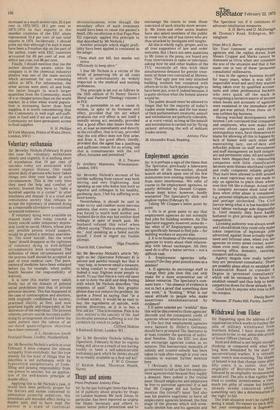Sir: Mr Beverley Nichols's article in your February 8 issue
compels the utmost sympathy from everybody; but the true remedy for the state of things that he describes is not euthanasia, with its hypocritical paraphernalia of formfilling and passing responsibility from one person to another, but an application of the well-known principle of double effect.
Applying this to Mr Nichols's case, it would have been perfectly proper for the doctors and nurses concerned to administer powerful sedatives, the immediate, and intended effect being to deaden pain, and to have kept the patient in a state of continual unconsciousness, even though the secondary effect of such treatment would have been to cause the patient's death. (My recollection is that Pope Pius XII expressly applied this principle to that described by Mr Nichols.) Another principle which might profitably have been applied is contained in the adage: "Thou shalt not kill, but needst not strive Officiously to keep alive."
I fear Mr Nichols is a victim of the fetish of preserving life at all costs which is unfortunately so widely respected in the medical and nursing professions. • This principle is set out as follows in the 1935 edition of Fr Henry Davis's Mora/ and Pastoral Theology volume I at P13: "It is permissible to set a cause in motion, in spite of its foreseen evil effect, provided that the act which produces the evil effect is not itself a morally wrong act; secondly, provided that a good effect also issues from the act, at least as immediately and directly as the evil effect, that is to say, provided that the evil effect does not first arise, and from it, the good effect; thirdly, provided that the agent has a justifying and sufficient reason for so acting, one that is commensurate with the evil effect, foreseen and permitted."
R. L. Travers 5c Artillery Mansions, Westminster, London, SW I


































 Previous page
Previous page